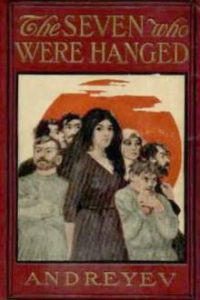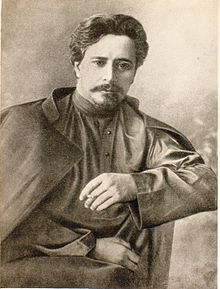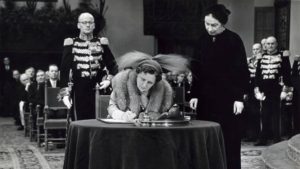Leonid Andreyev ~ The Seven Who Were Hanged
Foreword by Herman Bernstein
Leonid Andreyev, who was born in Oryol, in 1871, is the most popular, and next to Tolstoy, the most gifted writer in Russia to-day. Andreyev has written many important stories and dramas, the best known among which are “Red Laughter,” “Life of Man,” “To the Stars,” “The Life of Vasily Fiveisky,” “Eliazar,” “Black Masks,” and “The Story of the Seven Who Were Hanged.”
In “Red Laughter” he depicted the horrors of war as few men had ever before done it. He dipped his pen into the blood of Russia and wrote the tragedy of the Manchurian war.
In his “Life of Man” Andreyev produced a great, imaginative “morality” play which has been ranked by European critics with some of the greatest dramatic masterpieces.
The story of “The Seven Who Were Hanged” is thus far his most important achievement. The keen psychological insight and the masterly simplicity with which Andreyev has penetrated and depicted each of the tragedies of the seven who were hanged place him in the same class as an artist with Russia’s greatest masters of fiction, Dostoyevsky, Turgenev and Tolstoy.
I consider myself fortunate to be able to present to the English-reading public this remarkable work, which has already produced a profound impression in Europe and which, I believe, is destined for a long time to come to play an important part in opening the eyes of the world to the horrors perpetrated in Russia and to the violence and iniquity of the destruction of human life, whatever the error or the crime.
Introduction by Leonid Andreyev
I am very glad that “The Story of the Seven Who Were Hanged” will be read in English. The misfortune of us all is that we know so little, even nothing, about one another—neither about the soul, nor the life, the sufferings, the habits, the inclinations, the aspirations of one another. Literature, which I have the honor to serve, is dear to me just because the noblest task it sets before itself is that of wiping out boundaries and distances.
As in a hard shell, every human being is enclosed in a cover of body, dress, and life. Who is man? We may only conjecture. What constitutes his joy or his sorrow? We may guess only by his acts, which are oft-times enigmatic; by his laughter and by his tears, which are often entirely incomprehensible to us. And if we, Russians, who live so closely together in constant misery, understand one another so poorly that we mercilessly put to death those who should be pitied or even rewarded, and reward those who should be punished by contempt and anger—how much more difficult is it for you Americans, to understand distant Russia? But then, it is just as difficult for us Russians to understand distant America, of which we dream in our youth and over which we ponder so deeply in our years of maturity.
The Jewish massacres and famine; a Parliament and executions; pillage and the greatest heroism; “The Black Hundred,” and Leo Tolstoy—what a mixture of figures and conceptions, what a fruitful source for all kinds of misunderstandings! The truth of life stands aghast in silence, and its brazen falsehood is loudly shouting, uttering pressing, painful questions: “With whom shall I sympathize? Whom shall I trust? Whom shall I love?”
In the story of “The Seven Who Were Hanged” I attempted to give a sincere and unprejudiced answer to some of these questions.
That I have treated ruling and slaughtering Russia with restraint and mildness may best be gathered from the fact that the Russian censor has permitted my book to circulate. This is sufficient evidence when we recall how many books, brochures and newspapers have found eternal rest in the peaceful shade of the police stations, where they have risen to the patient sky in the smoke and flame of bonfires.
But I did not attempt to condemn the Government, the fame of whose wisdom and virtues has already spread far beyond the boundaries of our unfortunate fatherland. Modest and bashful far beyond all measure of her virtues, Russia would sincerely wish to forego this honor, but unfortunately the free press of America and Europe has not spared her modesty, and has given a sufficiently clear picture of her glorious activities. Perhaps I am wrong in this: it is possible that many honest people in America believe in the purity of the Russian Government’s intentions—but this question is of such importance that it requires a special treatment, for which it is necessary to have both time and calm of soul. But there is no calm soul in Russia.
My task was to point out the horror and the iniquity of capital punishment under any circumstances. The horror of capital punishment is great when it falls to the lot of courageous and honest people whose only guilt is their excess of love and the sense of righteousness—in such instances, conscience revolts. But the rope is still more horrible when it forms the noose around the necks of weak and ignorant people. And however strange it may appear, I look with a lesser grief and suffering upon the execution of the revolutionists, such as Werner and Musya, than upon the strangling of ignorant murderers, miserable in mind and heart, like Yanson and Tsiganok. Even the last mad horror of inevitably approaching execution Werner can offset by his enlightened mind and his iron will, and Musya, by her purity and her innocence. ***
 But how are the weak and the sinful to face it if not in madness, with the most violent shock to the very foundation of their souls? And these people, now that the Government has steadied its hands through its experience with the revolutionists, are being hanged throughout Russia—in some places one at a time, in others, ten at once. Children at play come upon badly buried bodies, and the crowds which gather look with horror upon the peasants’ boots that are sticking out of the ground; prosecutors who have witnessed these executions are becoming insane and are taken away to hospitals—while the people are being hanged—being hanged.
But how are the weak and the sinful to face it if not in madness, with the most violent shock to the very foundation of their souls? And these people, now that the Government has steadied its hands through its experience with the revolutionists, are being hanged throughout Russia—in some places one at a time, in others, ten at once. Children at play come upon badly buried bodies, and the crowds which gather look with horror upon the peasants’ boots that are sticking out of the ground; prosecutors who have witnessed these executions are becoming insane and are taken away to hospitals—while the people are being hanged—being hanged.
I am deeply grateful to you for the task you have undertaken in translating this sad story. Knowing the sensitiveness of the American people, who at one time sent across the ocean, steamers full of bread for famine-stricken Russia, I am convinced that in this case our people in their misery and bitterness will also find understanding and sympathy. And if my truthful story about seven of the thousands who were hanged will help toward destroying at least one of the barriers which separate one nation from another, one human being from another, one soul from another soul, I shall consider myself happy.
—
Chapter 1
At one o’clock, your excellency!
As the Minister was a very stout man, inclined to apoplexy, they feared to arouse in him any dangerous excitement, and it was with every possible precaution that they informed him that a very serious attempt upon his life had been planned. When they saw that he received the news calmly, even with a smile, they gave him, also, the details. The attempt was to be made on the following day at the time that he was to start out with his official report; several men, terrorists, whose plans had already been betrayed by a provocateur, and who were now under the vigilant surveillance of detectives, were to meet at one o’clock in the afternoon in front of his house, and, armed with bombs and revolvers, were to wait till he came out. There the terrorists were to be trapped.
“Wait!” muttered the Minister, perplexed. “How did they know that I was to leave the house at one o’clock in the afternoon with my report, when I myself learned of it only the day before yesterday?”
The Chief of the Guards stretched out his arms with a shrug.
“Exactly at one o’clock in the afternoon, your Excellency,” he said.
Half surprised, half commending the work of the police, who had managed everything skilfully, the Minister shook his head, a morose smile upon his thick, dark lips, and still smiling obediently, and not desiring to interfere with the plans of the police, he hastily made ready, and went out to pass the night in some one else’s hospitable palace. His wife and his two children were also removed from the dangerous house, before which the bomb-throwers were to gather upon the following day.
While the lights were burning in the palace, and courteous, familiar faces were bowing to him, smiling and expressing their concern, the dignitary experienced a sensation of pleasant excitement—he felt as if he had already received, or was soon to receive, some great and unexpected reward. But the people went away, the lights were extinguished, and through the mirrors, the lace-like and fantastic reflection of the electric lamps on the street, quivered across the ceiling and over the walls. A stranger in the house, with its paintings, its statues and its silence, the light—itself silent and indefinite—awakened painful thoughts in him as to the vanity of bolts and guards and walls. And then, in the dead of night, in the silence and solitude of a strange bedroom, a sensation of unbearable fear swept over the dignitary.
The complete book: https://www.gutenberg.org/6722-h.htm

